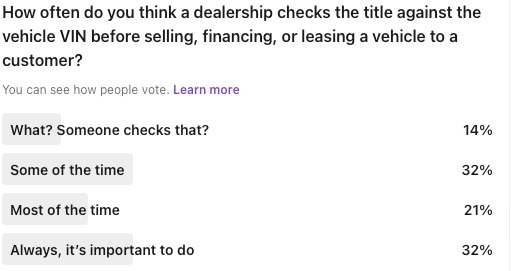Why it is important to check your vehicle's VIN plate against your title
All of us working in the auto finance and remarketing fields cringe when we hear about a title problem. In this week’s stories from the front lines of remarketing & automotive finance, I talk about one of the most “fun” title issues I had to help solve. As my recent LinkedIn poll alluded to, how often or how little titles are checked against a vehicle’s physical VIN plate may surprise you. The results indicate some of you have more trust than maybe they should. Have a great week!
Jason Herman
6/20/20235 min read
Nothing gets a remarketer or dealership squirming more than hearing there is a major title issue on a vehicle. We all know that most likely means dealing with state offices and other regulatory agencies and that it won’t happen overnight when we have an asset that is depreciating by the day.
Several years ago, I was running remarketing for a large leasing institution. One of my operation managers came into my office and said, we have a weird one, and I wanted to get your thoughts. That was never good, as he was very good at what he did, and if he couldn’t figure it out, it was going to be a fun challenge. This ended up being one of the most challenging to entangle and then solve.
I will try to save you some of the boring details, but keep in mind that at the time, we didn’t have all the answers that later seemed to all make sense, which is what I am including in this article. We had a high-end luxury vehicle at auction that the title in the vault didn’t match the VIN on the car. Not too unusual really, so after verifying the titles were not just switched in storage, we started with the logical, is the VIN on the vehicle correct and in multiple places on the car (we have all seen manufactures put the wrong VIN’s on cars on rare occasions)? As it turns out, it was correct. When I searched our database, I found that the VIN on the actual title was also leased by us, but by a different dealer and at a different time. That particular vehicle had long since been traded in and paid off. In fact, in running a vehicle history report, it had been sold 4 times since it was new. How could that be when we still had a valid and original title.
So I went to my go to and googled the VIN. As luck would have it, it had just been purchased by a large dealer in Southern California directly from a customer. I called the title office of the dealer and asked them if they wouldn’t mind checking the VIN on the actual vehicle to see if it matched what their title showed. The title clerk, in stereotypical title clerk fashion, said I don’t need to do that, as I am sure we would have verified that when we bought it from the consumer directly. I told her to humor me and please check. She called me back about 10 minutes later and said, you know what, you are right, they don’t match. She said we will be calling the customer who sold us the car back right away to bring our check back and get his car. I told her to please have him call me, as we had the title to his car and he had ours.
Well, you may say that should be an easy fix on the surface. Not so fast though, we had two titles in the wrong people’s names and it isn’t as simple as swapping titles and going on about our business. Not to mention everyone’s favorites, CarFax & AutoCheck were reporting different miles than these vehicles actually had because in the case of one of them, the dealer was reporting to the wrong vehicle every time the car came in for service (so much for double checking the VIN in service) and the mileage was more than what the actual vehicle had on it and even when the one vehicle was sold multiple times, they reported the wrong mileage on the wrong vehicle, resulting in the oh so great “possible odometer rollback” brand.
This was in California, of course, so I knew we were probably in for a year process to get the titles corrected, then the vehicle history reports updated, and were able to sell the vehicle. The challenge was made more difficult by an end consumer who just wanted to sell his car and be done. I could not blame him, as he had been the victim of the same issue we had as a financial institution. The good news for us was that the market was on the rise during this rare post Great Recession time and the vehicles were actually worth more money when the title issues were corrected, resulting in a rare occurrence of making more than you could have a year before. You can’t usually count on that though.
So I am sure you are wondering, how did this all happen? Well, as it turns out, after I spent some time investigating, I realized both vehicles were originally built exactly the same, same color and options, and delivered to the same dealership to start. One of them was dealer traded though to a dealer several hours north in the northern part of California. The mistake was simple, they sent the wrong car than what they were supposed to on paper. The title was sent for the car on the paperwork, but no one ever checked the title to the actual car to catch the mistake at the originating dealers. It would have been a simple fix at that point if they had. It also wasn’t checked at the three other times that same vehicle would later be sold before I came into contact with the end consumer who was trying to sell it. Pretty crazy, right? Or maybe not.
As an avid car enthusiast and someone who helps people buy and sell cars often, I am always amazed that I have only once had a dealer take a vehicle’s title presented in the F&I office outside to check the VIN against the car. I watched a very astute Honda F&I manager do it once. He appreciated this above story very much when I saw him do it and told him that he was a rarity, but it got me thinking about how often dealers or individuals really check the title and VIN when selling or buying a vehicle. Prior to doing this article, I put out the poll below on LinkedIn. The results were a bit surprising on the trust people put in this check being done.
My experience tells me the answer is likely some of the time, but probably happens less often than most of us think and even those in the business. I am sure there are variations in the practice from state to state, as many states require VIN verifications if a vehicle is new to a state. I won’t pretend to know all the different state laws and resulting dealer practices, but I would venture to say that there are more vehicles out there where something similar may have happened, purely unintentional, but also in a fraudulent manner as well. We may just not know it yet. A good reminder to think through your process if you are in the auto finance or dealership world & ensure you have the proper checks in place. And a good tip for even consumers buying a new or used vehicle. It is worth preventing a future hassle by doing a quick VIN check.
About the author:
Jason Herman is a 23-year veteran in the remarketing and automotive finance world and an avid car enthusiast. Having managed bank and fleet lease end operations, 1st and 3rd party remarketing, residual value setting & risk mitigation, and the sale of well over 1 million off lease & repossessed vehicles in his career, he enjoys providing guidance and expertise to both those new to and experienced in the automotive finance industry, as well as helping end consumers purchase or sell vehicles. Should he able to help, Jason can be reached at Jason@carguy4u.com.






